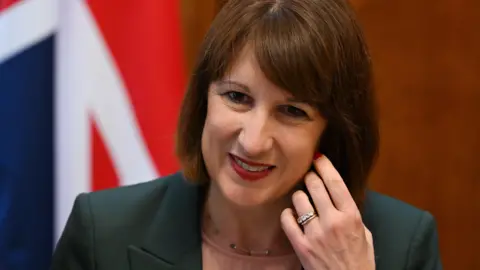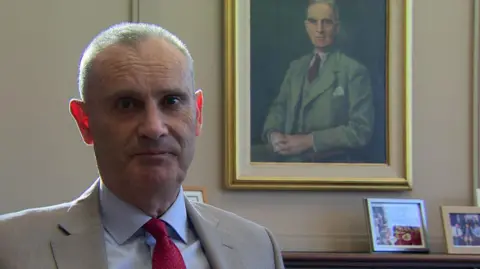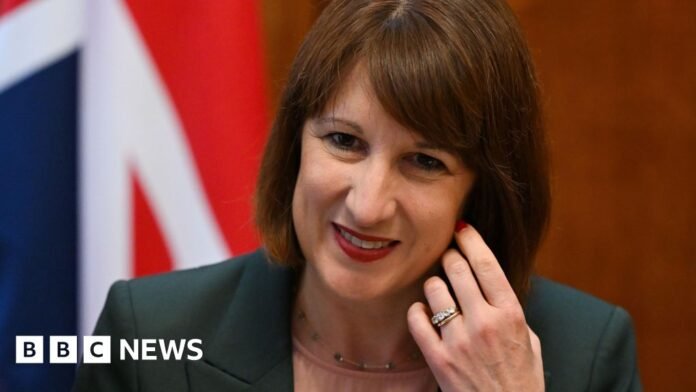BBC News NI business unit
 PA Media
PA MediaNI Executive ministers will find out later what the chancellor’s revised spending plans are likely to mean for Stormont budgets.
Rachel Reeves may announce lower spending increases for central government departments over the next few years.
That would have a knock-on effect for the executive’s budget, which is largely influenced by spending changes in England.
Further cuts to some benefits are also expected to be published alongside Reeves’ Spring Statement.
Spending cuts aimed at making savings of £5bn year by 2030 from the UK welfare bill were outlined last week.
That could mean thousands of people in NI lose some or all of their Personal Independence Payment (PIP), a sickness and disability benefit.
However a budget watchdog has concluded those cuts will save less than the government hoped.
It is understood the Office for Budget Responsibility (OBR) assessed that many claimants facing losing health-related benefit payments would instead claim for more severe conditions.
The government did not deny reports, first carried by The Times, that the chancellor would make further cuts to try to make up some of the shortfall.
Measures could include freezing or cutting some rates of Universal Credit, the main working age benefit.
What is the block grant?
Reeves’ budget in October involved a significant increase in public spending.
It meant that Stormont got an additional £640m to spend in this financial year and a further £1.5bn for the new financial year, which starts next week.
The chancellor’s plans suggested increases in public spending would moderate after that, with day-to-day public spending increasing by only 1.3% a year from 2026.
Those spending increases could now be reduced to help the government meet its self-imposed rules on taxing, spending and borrowing.
That affects Stormont as the majority of the money that it spends comes from the Treasury, in what is known as the block grant.
Changes to the block grant are made using the Barnett formula.
It gives Northern Ireland a population-based share of increased spending in England, adjusted for the extent to which services are devolved.
An interim deal between the executive and the UK government made last year means Northern Ireland also gets a 24% needs-based top up of any additional funding.
Executive ministers are seeking further agreement on reform of Stormont’s funding but that will not be dealt with until the UK government’s spending review later this year.
 PA Media
PA MediaOn Tuesday night, the chancellor announced a further £2.2bn increase in defence spending from April, as she warns that the UK had to “move quickly in a changing world”.
She is expected to say: ‘”As defence spending rises, I want the whole country to feel the benefits.”
However additional spending on defence will not mean more money for Stormont.
That is because no defence powers are devolved therefore the Barnett formula does not deliver any additional funding.
Northern Ireland could still benefit from defence spending if more money is spent on defence contractors in Northern Ireland.
For example earlier this month Thales, a French arms manufacturer, said it would open a new facility in NI and recruit 200 staff.

Meanwhile businesses are calling for the chancellor to soften the impact of the looming increase in employers National Insurance – a tax businesses pay on employee wages.
The increase was announced at the budget and will apply from next week.
Managing director of Ulster Carpets Nick Coburn said he was looking for a “rebalance” in the Spring Statement.
The company which is headquartered in Portadown employs 700 people worldwide.
Mr Coburn said: “All our businesses are UK-based – that is adding £2m of cost directly on to all our UK business which is very substantial and was very much not signalled – it has been quite a shock to absorb.”
As a result, he said it had meant a reduction in their workforce numbers in north- east England.
“We have tried to pass on some of these costs to customers but the business environment is tough now, not just in the UK but also things happening with tariffs in America that affect the global economy,” he said.
“It’s not an easy environment to sell in to and certainly not one where you can push your prices up particularly high.”
He acknowledged the main measures from the budget were unlikely to be reversed but said the government needed to bring forward pro-growth measures.
“We’re looking for signals at least, if nothing else, that the government has understood that if they want to promote growth and promote business, they have got to support that,” he said.





